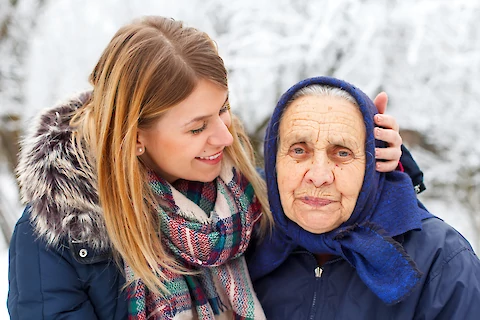
How Seasonal Affective Disorder Can Affect Family Caregivers
As the winter drags on, seniors and their caregivers in Frederick and Hagerstown may find themselves dealing with the symptoms of seasonal affective disorder. The seasonal affective disorder can cause feelings of low energy, weight gain, appetite changes, or feeling sluggish. Some people with SAD may sleep too much, while others may have difficulty concentrating. In addition, SAD can cause many of the same symptoms as depression, including losing interest in common activities or feeling hopeless.
Both seniors and their caregivers can suffer from symptoms of seasonal affective disorder.
When a Senior Loved One Shows Symptoms of SAD
Noting symptoms of SAD in a loved one can prove worrisome. Many seniors find that colder weather drives them indoors, where they may have lower overall exposure to vitamin D. Furthermore, increased risk of illness during the fall and winter months may increase the risk that seniors will avoid activities that they once enjoyed.
Caregivers with loved ones living with the seasonal affective disorder can take several steps to help them.
1. Invest in a Light Box
A light box can provide needed phototherapy, which can help raise vitamin D levels and improve overall outcomes. Using a light box during daylight hours, especially when seniors cannot get outside or do not want to due to the weather, can help improve SAD symptoms.
2. Try to Encourage Getting Outside
Many seniors do not like to get outside in the cold. However, caregivers can encourage more outdoor activity, when possible, to help improve symptoms of SAD. In addition, caregivers may want to consider having their loved one sit by a window.
3. Plan Activities That Bring Joy
Often, having meaningful activities that bring joy can help stave off symptoms of seasonal depression. Planning enjoyable activities with a senior loved one can help increase joy and decrease gloom.
When Caregivers Have Symptoms of SAD
Anyone can have symptoms of SAD. Caregivers for senior loved ones, already at high risk for burnout, may have a greater overall risk of SAD.
1. Plan in Self-Care
Caregivers need to pay particular attention to the need for self-care in their lives, especially if they are living with a seasonal affective disorder or seasonal depression. Eating right and getting plenty of exercises can help manage those symptoms.
2. Get Outside
Planning activities that take them outside can help encourage caregivers with symptoms of SAD to stave off the gloom. A short walk, planning a garden, or even simply sitting outside for a little while can all provide that boost of vitamin D and help with gloomy feelings.
3. Take a Break When Needed
Sometimes, caregivers may need to be particularly gentle with themselves when living with symptoms of SAD. Respite care can help offer a break from caring for senior loved ones.
Get Help Caring for a Senior Loved One in Frederick
Whether you need a break or have noticed your loved one's symptoms declining as the winter creeps on, if you live in Thurmont or Middletown, Senior Helpers Frederick can help. Contact us today to learn more about our respite care, in-home care options, and other senior care assistance.